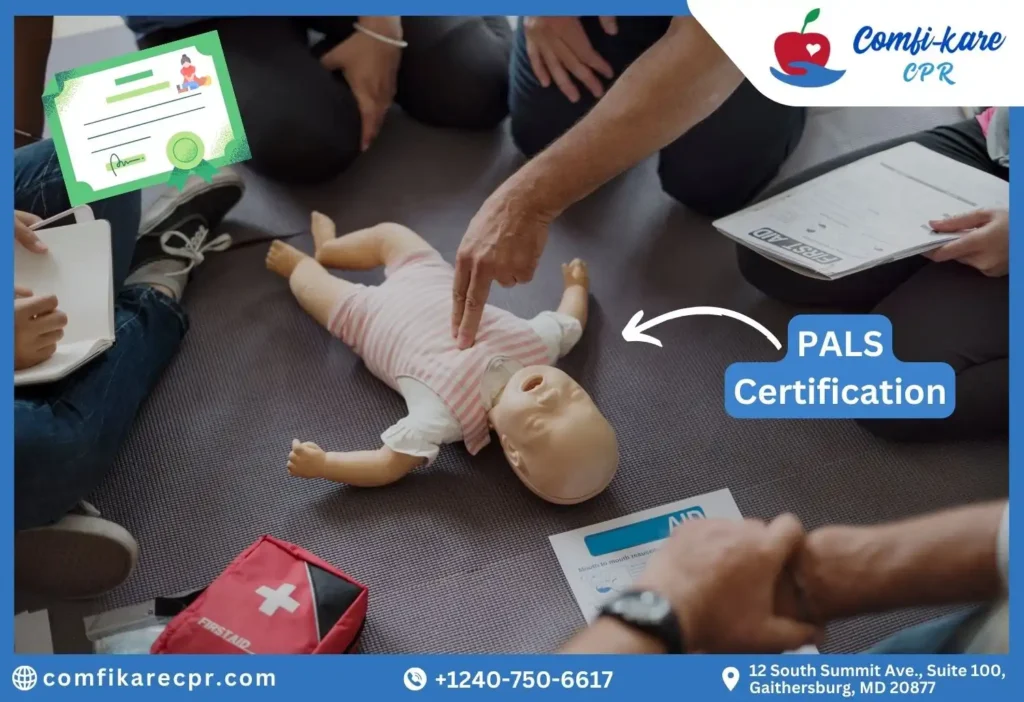
Meeting a medical emergency is a very common scenario in a hospital setting. Just think of the critical moments when you have to deal with a pediatric emergency. In those critical hours, you need to be consistent and diligent while making a decision. Thankfully, the American Heart Association (AHA) has realized the rising cases of pediatric emergencies and promoted Pediatric Advanced Life Support (PALS) certification.
As you continue reading this, you come across various opportunities to improve your medical skills during the PALS certification. Meanwhile, we will also discuss one of the most frequently asked questions: how many times can you retake the PALS test?
As you are reading this blog, you are getting interested in learning more about the PALS certification course.
So, let’s begin with that.
What is PALS Certification?
PALS, or Pediatric Advanced Life Support Certification, is a training program for healthcare professionals to deal with pediatric medical emergencies. Medical professionals get training on how to deal with child health emergencies and give them the appropriate medical treatment whenever necessary.
In the PALS course, you learn about
- Cardiac arrest
- Respiratory emergencies
- Shock treatment
- Recognizing medical emergencies
- Hands-on training or stimulating medical emergencies
- Access emergency
- Recognizing the causes of cardiac emergencies
- Airway management
- Using pediatric defibrillators and so on
As you absorb this information, you need to acknowledge that failing the PALS test doesn’t make you bad or less capable. All you need is to refine your skills with more training to ensure that you are doing your best.
Understanding the PALS Test
To pass the PALS test, the American Heart Association (AHA) recommends a minimum of 84%, where you get 50 multiple-choice questions.
However, in the skill training test provided by the training provider, you at least need a minimum score of 80% on the test before going for the written test.
Keep in mind that the different training centers have different formats that help in scoring for skill assessment. For written exams, the minimum score is 84%, while in skill training tests, you need to score around 80%.
How many times can you take the PALS course?
Some AHA-certified institutions offer one to two immediate retests with an initial course fee. This helps you correct your mistakes or brush up on the areas wherever required. Your PALS instructors will be there to help you out if you fail. So, don’t worry about not scoring well.
Instead, focus on making improvements by identifying the areas of weakness and making revisions to the theoretical concepts while clarifying your knowledge.
How Will PALS Certification Enhance Your Medical Skills?
With proper training in pediatric emergencies, you will be able to gain insights into various medical emergencies. PALS training helps in developing knowledge and skills that are necessary to deal with various medical emergencies with confidence. Once you enroll in a PALS training class, you get to know about the benefits of obtaining PALS certification.
As you continue to move down the page, you will gain insight into how PALS certification enhances your medical skills. So, not only is the course rewarding in itself, but it also lets you learn about various guidelines and state regulations on PALS.
Here are some of the points to consider:
Early Recognition and Rapid Response
In the PALS certification, you learn ways to recognize the subtle signs of health deterioration. After learning about various signs of emergencies, healthcare professionals respond accordingly to mitigate any further risks and improve the health outcomes of loved ones. This prevents health complications and lets the individual recover with rapid-response interventions.
Advanced Resuscitation Techniques
Healthcare professionals learn about various age-appropriate resuscitation techniques, like chest compression, infant and newborn breaths, pediatric defibrillators, medication administrations, and so on. Moreover, you will also get to learn about the updated PALS guidelines and regulations related to it.
Confidence and Competency
PALS instructors teach instructors to act decisively to ensure that you learn properly about teamwork and communication. This helps to build confidence and lets you deal with medical emergencies thoroughly with significant solutions.
In the healthcare industry, there is an unending demand for healthcare professionals. Therefore, you need to upskill yourself for continuous professional success and personal development.
By investing in PALS certification, you can enhance your medical skills and contribute to the well-being and survival of an individual.
You can also renew your PALS certification if it has expired.
Take a step to deliver high-quality care to your loved ones.



